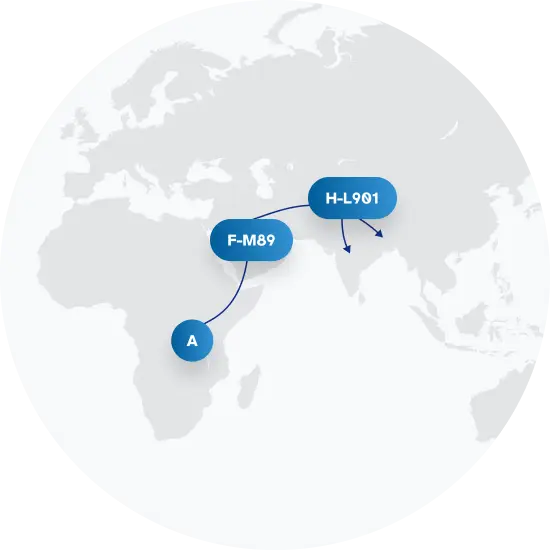Explore the Family Name Anand
How common is the last name Anand in the United States?
Based on the Decennial U.S. Census data, the surname Anand significantly increased in popularity between 2000 and 2010. In 2000, it was ranked 14,101 in terms of popularity, but by 2010, it had jumped up to a rank of 8,651. This represents a change of 38.65%. The count of people with the surname also rose sharply from 1,958 to 3,798 during this decade, indicating a near doubling (93.97%) of individuals identifying with the Anand name. In terms of proportion per 100,000 people, the figures also show an increase of 76.71%; the ratio moved from 0.73 to 1.29.
| 2000 | 2010 | Change | |
|---|---|---|---|
| Rank | #14,101 | #8,651 | 38.65% |
| Count | 1,958 | 3,798 | 93.97% |
| Proportion per 100k | 0.73 | 1.29 | 76.71% |
Race and Ethnicity of people with the last name Anand
In terms of ethnic identity, the Decennial U.S. Census data shows that most of those bearing the surname Anand identified themselves as Asian/Pacific Islander in both 2000 and 2010, though the percentage rose from 86.11% to 92.07% over the decade. People of mixed ethnicity who bore the name decreased from 7.66% to 2.98%, and Whites decreased from 4.95% to 3.79%. Hispanics carrying the Anand surname also dropped from 0.82% to 0.34%. Interestingly, those identifying as Black and American Indian/Alaskan Native were not represented in 2000, but by 2010, they made up 0.21% and 0.61% of the Anand population respectively. These percentages may appear small, but they represent important shifts in the ethnic identities associated with the surname.
| 2000 | 2010 | Change | |
|---|---|---|---|
| Asian/Pacific Islander | 86.11% | 92.07% | 6.92% |
| White | 4.95% | 3.79% | -23.43% |
| Two or More Races | 7.66% | 2.98% | -61.1% |
| American Indian and Alaskan Native | 0% | 0.61% | 0% |
| Hispanic | 0.82% | 0.34% | -58.54% |
| Black | 0% | 0.21% | 0% |
Anand ancestry composition
23andMe computes an ancestry breakdown for each customer. People may have ancestry from just one population or they may have ancestry from several populations. The most commonly-observed ancestry found in people with the surname Anand is Northern Indian & Pakistani, which comprises 62.2% of all ancestry found in people with the surname. The next two most common ancestries are Southern Indian Subgroup (13.0%) and Southern Indian & Sri Lankan (9.6%). Additional ancestries include British & Irish, Bengali & Northeast Indian, Eastern European, Central Asian, and Chinese.
Ready to learn more about your ancestry? Get the most comprehensive ancestry breakdown on the market by taking our DNA test. Shop 23andMe
| ANCESTRY BREAKDOWN | COMPOSITION |
|---|---|
| Northern Indian & Pakistani | 62.2% |
| Southern Indian Subgroup | 13.0% |
| Southern Indian & Sri Lankan | 9.6% |
| Other | 15.2% |

Possible origins of the surname Anand
Your DNA provides clues about where your recent ancestors may have lived. Having many distant relatives in the same location suggests that you may all share common ancestry there. Locations with many distant relatives can also be places where people have migrated recently, such as large cities. If a large number of individuals who share your surname have distant relatives in a specific area, it could indicate a connection between your surname and that location, stemming from either recent ancestral ties or migration.
Based on 23andMe data, people with last name Anand have recent ancestry locations spanning a few countries, mostly in Pakistan, and India.
| RECENT ANCESTRY Location | Percentage |
|---|---|
| Punjab, Pakistan | 56.60% |
| Khyber Pakhtunkhwa, Pakistan | 49.50% |
| Sindh, Pakistan | 42.40% |
| Tamil Nadu, India | 11.10% |
| Gujarat, India | 9.10% |
What Anand haplogroups can tell you
Haplogroups are genetic population groups that share a common ancestor on either your paternal or maternal line. These paternal and maternal haplogroups shed light on your genetic ancestry and help tell the story of your family.
The top paternal haplogroup of people with the surname Anand is H-Z4417, which is predominantly found among people with Central & South Asian ancestry. Haplogroup H-Z4417 is descended from haplogroup H-L901. Other common haplogroups include H-Z4469 and H-M52, which are predominantly found among people with Central & South Asian and Central & South Asian ancestry. Other surnames with similar common haplogroups are: Jain, Gupta, Garg, Agrawal, Agarwal, Aggarwal, Shah, Mehta, Kumar, Deaver.
The most common maternal haplogroups of people with Anand surname are: M, M3a1, R. These most commonly trace back to individuals of Central & South Asian and European ancestry.
 Paternal Haplogroup Origins H-L901
Paternal Haplogroup Origins H-L901Your maternal lineage may be linked to many people of Europe and Asia
Most of Europe's most common haplogroups, including H, J, T, V and U, are offshoots of R. Some, like U, were involved in some of the earliest migrations to Europe, while others spread from the Middle East with the dawn of agriculture. These groups spread east as well, reaching Central Asia and India first with early farmers and then with Iron Age migrants. In East Asia, R gave rise to the dominant haplogroups F and B. Members of just one branch of B, B2, migrated from Siberia to the Americas after the peak of the Ice Age 18,000 years ago, where their descendants are found today. However, no other branches of R have been found in the indigenous people of North and South America.

What do people with the surname Anand have in common?
Spoiler alert: it's complicated. People with the same last name are usually no more genetically similar than a randomly sampled group of people from the same population. That said, people with the same surname are more likely to have similar ancestries than randomly sampled individuals. The reason is the tendency of people with similar cultural or geographical backgrounds to preferentially mate with one another. That's why people who share a surname may be more likely to share traits and tendencies in common than people within the general population. Check out the percentages below to see the prevalences of tastes, habits, and traits of people with your surname compared with prevalences among 23andMe users.
Preferences
Traits
Habits
Wellness

Migraine
A severe headache characterized by intense pain, sensitivity to light and sound, and often accompanied by nausea and vomiting.
"Anand" Surname 12.8%
23andMe Users 16.4%
Are health conditions linked to the last name Anand?
The short answer is that, if there is an association between surname and health, it's usually more about your ancestry than your name. Individuals with a given surname are no more genetically similar than the general population but often have similar ancestries. The populations of people associated with those shared ancestries often have sets of genetic variations, also known as alleles, in common. Some of those alleles are associated with a greater likelihood of developing certain diseases.
Disease variant frequency by ancestry
Disease allele frequencies in populations associated with the surname Anand are shown below. Important Note: not everyone with a disease allele will develop these health condition








